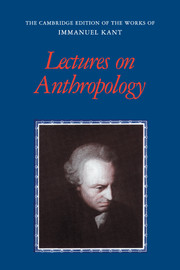Book contents
- Frontmatter
- Contents
- General editors’ preface
- Preface
- Abbreviations
- General introduction
- Anthropology Collins 1772–1773
- Anthropology Parow 1772–1773
- Anthropology Friedländer 1775–1776
- Anthropology Pillau 1777–1778
- Menschenkunde (1781–1782?)
- Translator's introduction
- Lecture of the Winter Semester 1781/82 [?] based on the transcriptions Menschenkunde, Petersburg
- Anthropology Mrongovius (1784–1785)
- Anthropology Busolt, 1788–1789
- Editorial notes
- Glossary
- Bibliography
- Index
Lecture of the Winter Semester 1781/82 [?] based on the transcriptions Menschenkunde, Petersburg
[Excerpts]
Published online by Cambridge University Press: 05 April 2013
- Frontmatter
- Contents
- General editors’ preface
- Preface
- Abbreviations
- General introduction
- Anthropology Collins 1772–1773
- Anthropology Parow 1772–1773
- Anthropology Friedländer 1775–1776
- Anthropology Pillau 1777–1778
- Menschenkunde (1781–1782?)
- Translator's introduction
- Lecture of the Winter Semester 1781/82 [?] based on the transcriptions Menschenkunde, Petersburg
- Anthropology Mrongovius (1784–1785)
- Anthropology Busolt, 1788–1789
- Editorial notes
- Glossary
- Bibliography
- Index
Summary
INTRODUCTION
One must distinguish two kinds of study: there are brooding sciences, which are of no utility to the human being, and there were formerly philosophers called scholastics, whose entire science consisted of surpassing each other in shrewdness; their art was science for the school, but one could not obtain any enlightenment for common life from it. One of them may be a great man, but only for the school and without the world having utility from his knowledge. A second kind of study consists not merely in gaining esteem for oneself from members of the school but also in extending knowledge beyond the school and trying to expand one's knowledge toward universal utility: this is study for the world. A science is scholastic when it is in accordance with the standards of the school and of the professions. This is a perfection not to be despised; for all sciences must be scholastic at the beginning, later they can also become popular in order to be accepted and made use of by mere admirers. Initially science should give satisfaction to the student of the craft, and then afterward we will see how it can best be grasped by common people. He who makes a scholastic use of his knowledge is a pedant, he knows how to describe his concepts merely with the technical expressions of the school and speaks merely in scholarly phrases of expression. He makes a use merely of scholastic cognitions in the world, but here one must understand simply how to apply one's knowledge popularly, so that others also understand us, not merely professional scholars. One laughs when pedants display their knowledge so inappropriately that they make a scholastic use of it in the world, for nothing is more laughable than when one shows no power of discrimination (judicium discretivum) and does not see what is fitting for the circumstances. Thus the pedant, who in other respects can be a man of merit, often gives us occasion to laugh. It is therefore necessary that we learn to make a popular use of our knowledge acquired in universities, so that we know, in our dealings with human beings, how to educate them or make ourselves be liked by them. We should 25:854be concerned not with the school but rather with the world; we must therefore study the world.
- Type
- Chapter
- Information
- Lectures on Anthropology , pp. 289 - 334Publisher: Cambridge University PressPrint publication year: 2012

